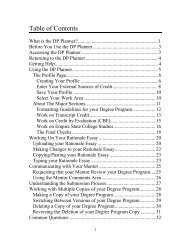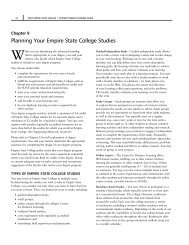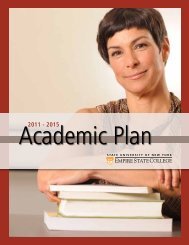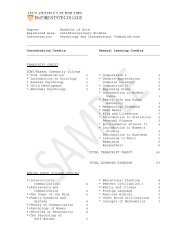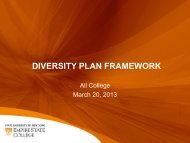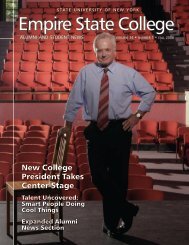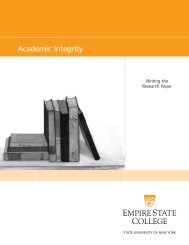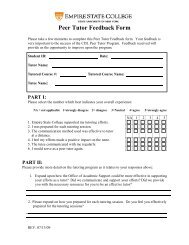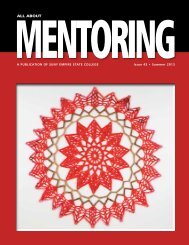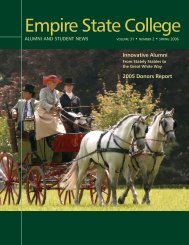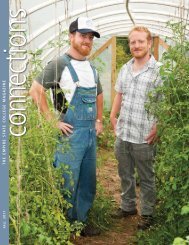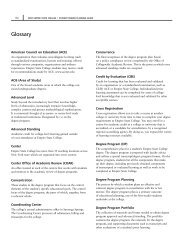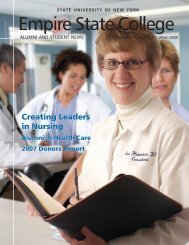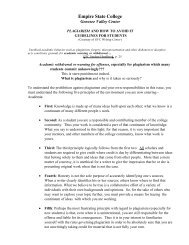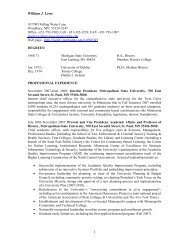All About Mentoring Spring 2011 - SUNY Empire State College
All About Mentoring Spring 2011 - SUNY Empire State College
All About Mentoring Spring 2011 - SUNY Empire State College
Create successful ePaper yourself
Turn your PDF publications into a flip-book with our unique Google optimized e-Paper software.
48<br />
They are moving from the highly structured,<br />
hierarchical military life to one that prizes<br />
individuality, choice and exploration. The<br />
decision-making skills needed for success in<br />
college can be overwhelming for veterans,<br />
especially for those with mental or physical<br />
injuries. Not all who have served in the<br />
military suffered physical injuries, but<br />
many veterans are coming to college with<br />
psychological needs that are different from<br />
those of other nontraditional students. The<br />
psychological effects from the trauma of war<br />
often contribute to student veterans’ feelings<br />
of isolation.<br />
Writer Maxine Hong Kingston in Veterans<br />
of War, Veterans of Peace (2006) explains<br />
how she discovered in her early work<br />
with veterans that they needed to write in<br />
order to help heal the trauma of war. By<br />
writing, they created a written record of<br />
their experience and were able to see how<br />
their thinking developed. “Processing chaos<br />
through story and poem, the writer shapes<br />
and forms experience, and thereby, I believe,<br />
changes the past and remakes the existing<br />
world. The writer becomes a new person<br />
after every story, every poem; and if the art<br />
is very good, perhaps the reader is changed,<br />
too” (p. 1-2).<br />
Dr. Edward Tick, a psychotherapist and<br />
author of War and the Soul (2005) writes<br />
about helping veterans recover from posttraumatic<br />
stress disorder. He believes<br />
that in order to heal, veterans need to tell<br />
their stories and have a public platform:<br />
“Veterans most often withhold their stories,<br />
not only because of the pain evoked in<br />
telling them but also because they fear that,<br />
in our culture of denial, we won’t properly<br />
receive them” (p. 221). Soldiers returning<br />
home need to share their stories, and writing<br />
them down helps them process their war<br />
experience.<br />
We were familiar with the work of James<br />
Pennebaker and Louise DeSalvo, Marion<br />
MacCurdy and Charles Anderson, and<br />
Jeffrey Berman, all who have worked<br />
with students using writing as a tool to<br />
help process difficult life events. It got us<br />
thinking. What if we created a study that<br />
could support our returning veterans and<br />
educate other students and ourselves about<br />
the multifaceted realities of war We were<br />
uneasy about it. What did we know of<br />
war – in these days of an all-volunteer<br />
army – two writing and literature mentors<br />
with no military service, who have never<br />
seen war firsthand We were keenly aware<br />
of our inexperience, our naïveté. So what<br />
business did we have mucking about<br />
creating a war course<br />
As experienced writing and literature<br />
teachers, what we do know about is the<br />
power of the written word. We know<br />
literature can illuminate aspects of your self<br />
and your experience; that writing helps you<br />
process what you know and what you don’t<br />
know; that both literature and writing are<br />
about making meaning, and even change<br />
people’s lives. We have experienced this<br />
ourselves and we’ve watched it happen<br />
to scores of students. Finding the stories,<br />
poems, films and articles that explored<br />
war was something we could do. We were<br />
confident we could create meaningful<br />
assignments that would help us all discover<br />
what happened to people directly and<br />
indirectly involved in war. With students,<br />
especially those who have had direct<br />
experience with war, we would educate each<br />
other. In his introduction to his War (1995)<br />
short story anthology, Jon E. Lewis writes:<br />
“War is the ultimate, the most extreme of<br />
human experiences … . No other human<br />
activity is like it, or so pervaded by the<br />
imminence of death. War is perhaps the<br />
supreme theater for asking the questions<br />
about what it means to be human” (p. xiv).<br />
And so we created, War Stories: Reading<br />
and Writing <strong>About</strong> the Impact of War,<br />
which was first offered in 2009; the study is<br />
currently a 4-credit study group organized<br />
into six modules.<br />
The first module asks an obvious question:<br />
What do we know of war The first writing<br />
assignment is this:<br />
Some of us know about war from firsthand<br />
experience, some from family and<br />
friends who were soldiers, but all of us<br />
got messages about war, courage and<br />
patriotism from our families, teachers –<br />
from different aspects of society, like<br />
TV, the movies and books. So what<br />
messages did you receive about war<br />
Who or what influenced you most in<br />
your thinking Are the messages you<br />
received as a child different from what<br />
you believe now<br />
The responses we received were not<br />
unexpected. Many students learned about<br />
war from TV and movies – and also from<br />
toys. Andy, who went on to become an<br />
Army Ranger and was among the first<br />
troops to parachute into Afghanistan during<br />
the U.S. invasion, wrote:<br />
I was about seven years old. I had<br />
my Air Force academy sweatshirt on,<br />
a sandwich in front of me, and the<br />
television blaring. I couldn’t eat my<br />
sandwich though, I was too intrigued<br />
with the movie I had on. Sure, I had<br />
seen it five times, but I couldn’t get<br />
enough of it. I loved Top Gun, I loved<br />
the military, I knew I wanted to be a<br />
part of that, and I knew it at a very<br />
young age. I wanted to be disciplined, I<br />
wanted to look sharp in that uniform,<br />
but most importantly I wanted to show<br />
my patriotism in the most simple, yet<br />
hardest way possible. I had the red,<br />
white and blue coursing through my<br />
veins. I had the “Star Spangled Banner”<br />
playing in my head. Ever since my first<br />
baseball game when my grandfather,<br />
a Korean War veteran, had me stand<br />
and take my Twins cap off and put it<br />
against my chest, I knew I wanted to be<br />
one of those sharp dressed men holding<br />
that flag.<br />
Laura wrote about her firsthand war<br />
experience as a young child:<br />
My first experience with war was in<br />
Cuba during the Revolution. Castro<br />
was fighting in the Sierra Madres and<br />
Batista was trying hard to keep him<br />
from getting a foothold in Havana and<br />
other major cities and towns. Being<br />
a small child, the real danger of the<br />
situation escaped me. There were times<br />
when windows were shot out and we<br />
slept on mattresses on the living room<br />
floor. My grandfather, with a shotgun<br />
in his hand would stay up all night,<br />
waiting and listening. Occasionally,<br />
men, bleeding from wounds would<br />
arrive at our back door. They would<br />
be ushered quickly and quietly to the<br />
kitchen, and then they were gone.<br />
Other students reported learning about<br />
war through the lens of good and evil as<br />
represented by the good guys and the bad<br />
guys; the good guys were always suppose to<br />
suny empire state college • all about mentoring • issue 39 • spring <strong>2011</strong>



